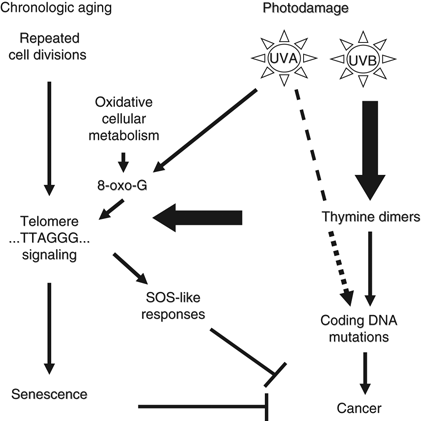
| MadSci Network: Cell Biology |
Greetings,
You are correct that cell damage can sometimes lead to cancer. However, the key trigger for that carcinogenic injury is cell DNA damage. Likewise, there must be some disruption of the cell's normal DNA replication to accelerate telomere shortening & aging.
Your misconception is probably based on the definition of 'cell repair' vs. 'skin repair'. When you hear about 'cell repair', it's usually in reference to the cell's repair of its damaged DNA. However, the damage inflicted by acne or eczema would typically require skin repair, but not DNA repair. Skin cells undergo a continual process of regeneration and repair. Unless the injury to the skin cells also damages their DNA, there should be no major effect on their propensity for cancer or telomeric aging. To my knowledge, no connection has been established between acne & skin cancer, either. Consequently, it is also unlikely that acne would effect DNA-targeted telomere shortening, although the role of telomeres in aging has not yet been as thoroughly investigated.
The evidence linking throat cancer to cell damage by hot drinks is very new, based on a single study with hot tea only. So if & how DNA damage may contribute to it is not yet known. However, lung cancer is unquestionably caused by cigarette smoking. But it is damage to the lung cell DNA by carcinogens in the cigarette smoke that triggers carcinogenesis. Likewise, the foremost environmental risk factors for skin cancer are UV-radiation & smoking, both of which target the cellular DNA. So-called photodamage, by UV-radiation, may also accelerate telomere shortening & skin aging, as illustrated in the following diagram presented @ the Society of Japanese Photo-Aging Research Annual Meeting in 2008:

So to summarize, cellular injury & repair would not be expected to trigger cancer or accelerated aging unless there is damage to the cellular DNA itself. It should also be emphasized that even if there is DNA damage, our cells have a variety of very effective DNA repair processes to correct that damage. But as you noted, the more frequent that repair is required, the greater the possibility for disease-causing errors. However, acne is not currently known to contribute to DNA damage or considered to be a major risk factor for skin cancer or telomere shortening & aging.
Yours was actually a very good question. Hopefully, this explanation will help clarify some misunderstandings of cellular & DNA repair,
Jeff Buzby, Ph.D.
CHOC Research
Institute
Try the links in the MadSci Library for more information on Cell Biology.